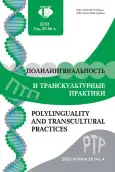О необычном названии трутня в удмуртском языке XVIII века
- Авторы: Ившин Л.М.1
-
Учреждения:
- Удмуртский федеральный исследовательский центр Уральского отделения Российской академии наук
- Выпуск: Том 20, № 4 (2023)
- Страницы: 650-658
- Раздел: Языковая система
- URL: https://journal-vniispk.ru/2618-897X/article/view/326669
- DOI: https://doi.org/10.22363/2618-897X-2023-20-4-650-658
- EDN: https://elibrary.ru/MGYEOI
- ID: 326669
Цитировать
Полный текст
Аннотация
Актуальность предложенной темы обусловлена недостаточным выявлением и описанием лексики фауны как одного из наиболее архаичных слоев в словарном запасе почти всех финно-угорских языков. Цель исследования - проследить историю письменной фиксации слова вар-бозго ‘трутень’ в удмуртском языке, начиная с момента первого его появления в самых ранних письменных памятниках XVIII в. и завершая основными лексикографическими работами современного периода, рассмотреть лексико-семантическое образование сложного наименования и определить по возможности его этимологию. Достижение поставленной цели представляется возможным при решении задач, связанных с выявлением и описанием этого энтомологического термина в сопоставлении с данными из других родственных и неродственных языков. Материалом исследования являются рукописные и опубликованные письменные памятники XVIII-XIX вв., важнейшие лексикографические работы по удмуртскому языку современного периода, а также возможные параллели этих слов из контактирующих родственных и неродственных языков. Используется в основном описательный метод, а также некоторые элементы семантического и сравнительно-этимологического анализа. Название вар-бозго ‘трутень’ является уникальным - не имеет типологических параллелей, оно зафиксировано лишь в одном письменном источнике - рукописной грамматике М. Мышкина, составленной во второй половине XVIII в. Для разработки вопроса приводится дальнейшая фиксация отдельных компонентов этого сложного слова в удмуртском языке, которые функционируют с большой и малой частотностью. В результате проведенного исследования было обнаружено расширение лексическо-семантического содержания слова бозго в ходе развития языка. Этимологический анализ позволил выявить происхождение составных элементов энтомологического термина: вар ‘слуга, раб’ имеет параллели во многих финно-пермских языках и является исконным удмуртским словом финно-пермского периода развития языка-основы; а происхождение компонента бозго ‘жук; навозный жук’ связывают со звукоподражательным словом боз ( боз-боз ), имитирующим жужжание или низкий голос, к которому в период самостоятельного формирования удмуртского языка был присоединен непродуктивный именной формант -го .
Ключевые слова
Об авторах
Леонид Михайлович Ившин
Удмуртский федеральный исследовательский центр Уральского отделения Российской академии наук
Автор, ответственный за переписку.
Email: ivleo.75@mail.ru
ORCID iD: 0000-0003-3774-2617
SPIN-код: 1603-3915
кандидат филологических наук, старший научный сотрудник отдела филологических исследований
Российская Федерация, 426004, г. Ижевск, ул. Ломоносова, д. 4Список литературы
- Rakin, A.N. 1997. I chthyonymic vocabulary in Permian languages. In Permistika 4: Perm languages and their dialects in synchrony and diachrony: Sat. articles. Izhevsk. Pp. 136–143. Print. (In Russ.).
- Nasibullin, R.Sh. 2019. “Udmurt terms on beekeeping”. In Finno-Ugric world in the multiethnic space of Russia: cultural heritage and new challenges Proceedings. Izhevsk: Izdvo Anny Zeleninoj publ. Print. Pp. 130–135. (In Russ.).
- Nasibullin, R.Sh. “Commentary on the Frame ‘truten’”. 2021. Dialectological atlas of the Udmurt language. Maps and comments. Vol. VIII. Izhevsk: Institut komp’uternykh issledovanij publ; NICz “Regulyarnaya i khaoticheskaya dinamika” publ. Pp. 152–156. Print. (In Russ.).
- Mogilin, M. 1998. Experience of a brief Udmurt grammar. Edited by L.E. Kirillova. Izhevsk: UIIYaL UrO RAN publ. Print. (In Russ.).
- Teplyashina, T.I. 1970. The language of the besermen. Moscow: Nauka publ. Print. (In Russ.).
- Kel’makov, V.K. 2004. Dialectal and historical phonetics of the Udmurt language. Vol. 2. Izhevsk: Udmurt university publ. Print. (In Russ.).
- Tarakanov I.V., Kondrat’eva N.V. 2019. Problems of historical lexicology of the Udmurt language. Izhevsk. Print. (In Russ., in Udmurt).
- Maksimov, S.A. Commentary on the Frame “zhuk-navoznik”. 2014. Dialectological atlas of the Udmurt language. Maps and comments. Vol. IV. Izhevsk: Institut komp’uternykh issledovanij publ; NICz “Regulyarnaya i khaoticheskaya dinamika” publ. Pp. 165–175. Print. (In Russ.).
Дополнительные файлы









